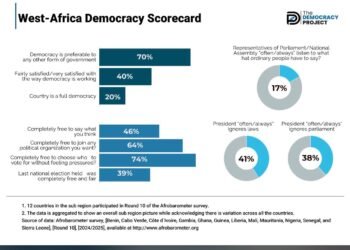The impending entry of Elon Musk’s Starlink into Ghana’s broadband market has sparked considerable debate among industry insiders, regulators, and telecom incumbents.
Bright Simons, the Honorary Vice President of IMANI Centre for Policy and Education, has provided an in-depth analysis of the situation, highlighting the nuanced impact of low earth orbit (LEO) satellite broadband providers on traditional telecom operators and government revenues.
Contrary to popular belief that LEO satellites could disrupt the telecom sector and diminish government tax revenues, Simons suggested that the reality is far more complex.
“Starlink is actually not Ghana’s first mass market satellite internet entrant. It was OneWeb, an Eutelsat subsidiary seeking to challenge Starlink that nearly went bankrupt in the process until it was rescued by the UK govt and Airtel.”
Bright Simons, Honorary Vice President of IMANI Centre for Policy and Education
Bright Simons noted that in 2022, OneWeb set up a gateway in Tema, managed by Comsys, a key player in Ghana’s enterprise connectivity sector, particularly favored by the financial industry. Although OneWeb’s rollout has been slow, it provided valuable insights to Ghanaian regulators and government officials when Starlink’s entry became a possibility.
However, as Bright Simons noted Starlink’s approach in Ghana has been markedly different. Unlike in Nigeria, where Starlink has established ground stations and is planning to build more, the company has shown little interest in setting up similar infrastructure in Ghana. This reluctance extends to the idea of partnering with local entities, a strategy that the Ghanaian government has been keen on.
The government, recognizing the potential of satellite broadband to improve rural connectivity, attempted to persuade Starlink to collaborate with RuraCom, a state-owned entity focused on rural telecommunications. Yet, Starlink has remained unenthusiastic about such partnerships.
The Ghanaian government responded to Starlink’s reluctance by introducing a new satellite internet licensing regime. This regime requires satellite broadband providers to partner with either RuraCom or established telecom incumbents for certain license categories. Despite these efforts, Starlink’s commitment to minimizing its in-country presence and costs remains unwavering.
“In Ghana, the company has only committed to paying the $25,000 “earth station network” license fee, along with a $6,000 application fee and 1% of its annual revenue.
“While these fees provide some revenue for the government, they pale in comparison to the substantial sums traditionally generated by the country’s telecom giants.”
Bright Simons, Honorary Vice President of IMANI Centre for Policy and Education
Bright Simons pointed out that this situation leaves Ghana’s telecom chiefs with limited options. Unlike in other countries, where the establishment of a physical gateway is a licensing requirement, Ghana has no such mandate. As a result, Starlink can operate with minimal local infrastructure, further limiting the financial benefits for the government.
Challenges in Scaling and Market Penetration
Starlink’s model of satellite broadband, while technologically advanced, faces significant challenges in achieving widespread adoption in Ghana. The high cost of equipment and subscriptions has been a barrier to entry for many potential users.
“In Nigeria, dishes go for $275 ($350 in Kenya), and a monthly subscription cost $24. In Kenya, monthly rental rates are a mere $15 a month.
“Yet, disposable incomes being what they are, Starlink has struggled to hit 30,000 subscribers in Nigeria and is estimated to have a mere 6000 subscribers in Kenya. Analysts, however, believe that weak marketing partnerships are equally to blame.”
Bright Simons, Honorary Vice President of IMANI Centre for Policy and Education
According to Bright Simons, the slow adoption rate is not solely due to cost. He emphasized that weak marketing partnerships have also hindered Starlink’s ability to penetrate these markets.
Unlike OneWeb, which has focused on forming strategic alliances with telecom incumbents, Starlink has been less inclined to collaborate with mobile network operators (MNOs) in the region. This reluctance has limited its reach and growth potential in markets like Ghana.
Despite these challenges, local incumbents see an opportunity to engage with satellite broadband providers. MTN, for instance, has been exploring pilot collaborations with multiple providers, including Starlink.
In Rwanda, MTN is experimenting with using Starlink to enhance enterprise connectivity, and elsewhere, the company has considered leveraging Starlink for backhaul operations. Vodacom, on the other hand, has aligned itself more closely with Starlink’s competitor, Amazon’s Project Kuiper.
OneWeb’s strategy, which increasingly relies on partnerships with incumbents, contrasts with Starlink’s more independent approach. In Taiwan, for example, OneWeb has become the fastest-growing bandwidth supplier for Chunghwa Telecom.
The company has also secured agreements with Orange to provide backhauling in rural and remote areas across Africa, Europe, and Latin America. Even geostationary satellite providers like Intelsat are collaborating with OneWeb to address latency issues in their networks.
As Bright Simons suggested, the road ahead for Starlink in Ghana is fraught with challenges. The company’s strategy of minimizing local infrastructure and prioritizing last-mile consumer relationships may limit its potential for success in a market that still heavily relies on traditional telecom models.
While the Ghanaian government and local incumbents may see opportunities for collaboration, Starlink’s reluctance to engage fully with these stakeholders could hinder its long-term prospects in the country.
For now, Ghana’s telecom chiefs may have to settle for the modest fees generated by Starlink’s operations. The broader implications of Starlink’s entry into Ghana, however, remain uncertain, as the company navigates a complex landscape of regulatory requirements, market challenges, and potential partnerships.
READ ALSO: Walz Addresses Firefighter Union Convention In Boston























